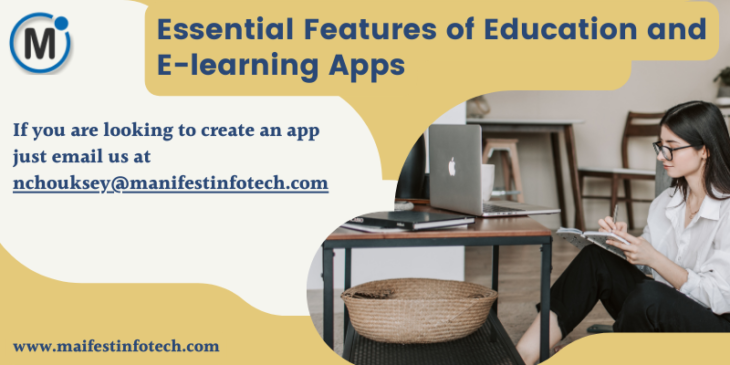
In this blog post, we’ll explore the essential features of education and e-learning apps that make them indispensable tools for modern-day learning.
𝟏. 𝐔𝐬𝐞𝐫-𝐟𝐫𝐢𝐞𝐧𝐝𝐥𝐲 𝐈𝐧𝐭𝐞𝐫𝐟𝐚𝐜𝐞: A user-friendly interface is essential for any education or e-learning app, ensuring that users can navigate the platform easily and access the features they need without hassle. Intuitive design, clear layout, and seamless navigation contribute to a positive user experience.
𝟐. 𝐌𝐮𝐥𝐭𝐢𝐦𝐞𝐝𝐢𝐚 𝐂𝐨𝐧𝐭𝐞𝐧𝐭: E-learning apps often incorporate multimedia content such as videos, animations, interactive quizzes, and simulations to engage learners and enhance understanding. These multimedia elements make learning more dynamic and interactive, catering to different learning styles and preferences.
𝟑. 𝐏𝐞𝐫𝐬𝐨𝐧𝐚𝐥𝐢𝐳𝐞𝐝 𝐋𝐞𝐚𝐫𝐧𝐢𝐧𝐠 𝐏𝐚𝐭𝐡𝐬: Personalized learning paths allow users to progress through content at their own pace and according to their individual learning goals and preferences. Adaptive algorithms analyze user performance and tailor recommendations to provide a customized learning experience.
𝟒. 𝐀𝐬𝐬𝐞𝐬𝐬𝐦𝐞𝐧𝐭 𝐚𝐧𝐝 𝐅𝐞𝐞𝐝𝐛𝐚𝐜𝐤: Built-in assessment tools enable learners to test their knowledge and skills through quizzes, tests, and assignments. Immediate feedback on performance helps users identify areas for improvement and track their progress over time.
𝟓. 𝐏𝐫𝐨𝐠𝐫𝐞𝐬𝐬 𝐓𝐫𝐚𝐜𝐤𝐢𝐧𝐠 𝐚𝐧𝐝 𝐑𝐞𝐩𝐨𝐫𝐭𝐢𝐧𝐠: Progress tracking features allow users to monitor their learning progress, track completion of courses or modules, and view performance metrics such as quiz scores and completion rates. Detailed reports provide insights into learning outcomes and help users set goals for continuous improvement.
𝟔. 𝐂𝐨𝐥𝐥𝐚𝐛𝐨𝐫𝐚𝐭𝐢𝐯𝐞 𝐋𝐞𝐚𝐫𝐧𝐢𝐧𝐠: Collaboration features facilitate interaction and collaboration among learners, enabling group discussions, peer feedback, and collaborative projects. Social learning tools promote engagement, knowledge sharing, and community building within the e-learning platform.
𝟕. 𝐌𝐨𝐛𝐢𝐥𝐞 𝐂𝐨𝐦𝐩𝐚𝐭𝐢𝐛𝐢𝐥𝐢𝐭𝐲: With the increasing use of mobile devices, ensuring compatibility with smartphones and tablets is crucial for e-learning apps. Mobile-friendly design and responsive layouts allow users to access educational content on the go, anytime, anywhere.
𝟖. 𝐎𝐟𝐟𝐥𝐢𝐧𝐞 𝐀𝐜𝐜𝐞𝐬𝐬: Offline access features enable users to download content for offline viewing, allowing them to continue learning even without an internet connection. This feature is especially useful for users with limited internet access or those who prefer to study offline.
𝟗. 𝐆𝐚𝐦𝐢𝐟𝐢𝐜𝐚𝐭𝐢𝐨𝐧 𝐄𝐥𝐞𝐦𝐞𝐧𝐭𝐬: Gamification elements, such as badges, rewards, leaderboards, and progress bars, add a fun and motivational aspect to learning. Gamified features encourage engagement, participation, and healthy competition among learners.
𝟏𝟎. 𝐀𝐜𝐜𝐞𝐬𝐬𝐢𝐛𝐢𝐥𝐢𝐭𝐲 𝐅𝐞𝐚𝐭𝐮𝐫𝐞𝐬: Accessibility features ensure that the e-learning app is inclusive and accessible to users with disabilities. Features such as text-to-speech, screen readers, and alternative text descriptions for images make educational content accessible to all learners.
𝟏𝟏. 𝐂𝐞𝐫𝐭𝐢𝐟𝐢𝐜𝐚𝐭𝐢𝐨𝐧 𝐚𝐧𝐝 𝐂𝐫𝐞𝐝𝐞𝐧𝐭𝐢𝐚𝐥𝐬: Some e-learning apps offer certification programs or credentials upon completion of courses or modules. Accredited certifications add value to the learning experience and enhance learners’ credentials in their field of study or profession.
𝟏𝟐. 𝐒𝐨𝐜𝐢𝐚𝐥 𝐈𝐧𝐭𝐞𝐠𝐫𝐚𝐭𝐢𝐨𝐧: Integration with social media platforms allows users to share their learning achievements, progress, and insights with their networks. Social integration also facilitates networking, collaboration, and knowledge sharing among learners and educators.
𝟏𝟑. 𝐂𝐨𝐦𝐦𝐮𝐧𝐢𝐭𝐲 𝐒𝐮𝐩𝐩𝐨𝐫𝐭 𝐚𝐧𝐝 𝐅𝐨𝐫𝐮𝐦𝐬: Community support features, such as forums, discussion boards, and online communities, provide a platform for learners to ask questions, seek help, and interact with peers and instructors. Community support fosters a sense of belonging and encourages engagement with the learning community.
𝟏𝟒. 𝐂𝐨𝐧𝐭𝐞𝐧𝐭 𝐂𝐮𝐫𝐚𝐭𝐢𝐨𝐧 𝐚𝐧𝐝 𝐑𝐞𝐜𝐨𝐦𝐦𝐞𝐧𝐝𝐚𝐭𝐢𝐨𝐧𝐬: Content curation and recommendation algorithms suggest relevant courses, resources, and learning materials based on users’ interests, preferences, and past behavior. Personalized recommendations help users discover new topics and stay engaged with their learning journey.
𝟏𝟓. 𝐒𝐞𝐜𝐮𝐫𝐢𝐭𝐲 𝐚𝐧𝐝 𝐏𝐫𝐢𝐯𝐚𝐜𝐲: Robust security measures, such as encryption, secure login, and data protection policies, ensure the confidentiality and integrity of users’ personal information and learning data. Privacy features give users control over their data and ensure compliance with data protection regulations.
If you are looking for any services related to Website Development, App Development, Digital Marketing and SEO, just email us at nchouksey@manifestinfotech.com or Skype id: live:76bad32bff24d30d
𝐅𝐨𝐥𝐥𝐨𝐰 𝐔𝐬:
𝐋𝐢𝐧𝐤𝐞𝐝𝐢𝐧: linkedin.com/company/manifestinfotech
𝐅𝐚𝐜𝐞𝐛𝐨𝐨𝐤: facebook.com/manifestinfotech/
𝐈𝐧𝐬𝐭𝐚𝐠𝐫𝐚𝐦: instagram.com/manifestinfotech/
𝐓𝐰𝐢𝐭𝐭𝐞𝐫: twitter.com/Manifest_info
#EducationApp #Elearning #LearningTools #DigitalLearning #OnlineEducation #EdTech #PersonalizedLearning #MobileLearning #InteractiveContent #AssessmentTools #ProgressTracking #CollaborativeLearning #MobileCompatibility #OfflineAccess #Gamification #AccessibilityFeatures #CertificationPrograms #SocialIntegration #CommunitySupport #ContentCuration #SecurityAndPrivacy #DigitalSkills #VirtualLearning #StudentEngagement #LifelongLearning